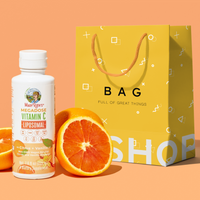FEATURED
BY COLLECTION
FIND MARYRUTH'S IN STORE!

STORE LOCATOR
Now you can find your all-time faves and discover some exciting new products while you're out shopping.
GET STARTED
This means it can be absorbed by your body without the presence of fats. Fat-soluble vitamins, on the other hand, are most effectively absorbed by your body when taken with a meal that includes some dietary fat.
Other water-soluble vitamins include vitamin C and the other B-complex vitamins. The fat-soluble vitamins that your body needs for its overall health and functioning are Vitamins A, E, D, and K.
You can take water-soluble supplements on an empty stomach, but fat-soluble vitamins are best saved for a meal.
Your brain needs B12 to function well, and when your B12 levels are low, you may have noticeable problems with focusing, attention, and mental energy.
Problems with focusing and energy are some symptoms of a vitamin B12 deficiency. If you are struggling with these symptoms, it’s possible that you aren’t getting enough B12.
For those who are experiencing some of these signs, supplementing with vitamin B12 may be just the solution you are looking for. Make sure to opt for a VEGAN B12 supplement if you are adhering to a plant-based diet! MaryRuth’s vegan B12 supplements are made with methylcobalamin, which has superior bioavailability to cyanocobalamin and is a preferred form for some with MTHFR gene variants!
While there can be smaller amounts of vitamin B12 in nutritional yeast and fortified cereals, it is found in greater quantities in animal foods. For vegans, this means that vitamin B12 supplements are an absolute must in order to avoid a deficiency. You can minimize the risk of developing a B12 deficiency if you add a B12 supplement to a healthy plant-based diet.
Both vitamin B12 and vitamin D3 are not found in many plant-based foods, so vegans may need to add these nutrients to their diets in supplement form. When a plant-based eater adds the right supplements to their diet, it can help to avoid deficiencies.
A B12 deficiency can also cause more problems in addition to a lack of energy and trouble focusing.
Lack of B12 can also lead to a type of anemia called pernicious anemia. When your body does not have enough vitamin B12 it can lead to this condition in which your body does not have enough healthy red blood cells.
Because Vitamin B12 is not found in many plant-based foods, it is nearly impossible for vegans to get enough of this nutrient from diet alone. If you are dealing with the telltale symptoms of nutrient deficiencies and are eating a plant-based diet, you may need to start taking supplements. If you’re concerned that you might have or be at risk of B12 deficiency, please speak with your doctor. They can help you determine the best solution for your health.
A B12 deficiency typically does not develop for some time after a person adopts a vegan lifestyle. Sometimes, it can even take a few years before you start noticing symptoms that indicate that your body is not getting enough B12.
One way that vegans and vegetarians can get some much-needed B12 from dietary sources is by eating fortified foods.
Many breads, cereals, and alternative non-dairy milks are fortified with B12 and other important nutrients. Since B12 can be so scarce in a vegan diet, these foods can be extremely helpful in keeping you from developing a dietary deficiency.
One of the most effective ways to avoid a vitamin B12 deficiency is by taking a high-quality supplement. Supplements can be taken in multiple forms, and they help you get a high concentration of an important nutrient.
B12 is an important supplement for vegans to take – as a nutrient that is not easily included in a vegan diet, supplementing is one of the best ways to compensate for the lack of vegan dietary sources of B12.
Vitamin B12 deficiencies can cause long-term health problems that reach far beyond just tiredness and trouble focusing. If you deal with a B12 deficiency for years, you can even start having problems with mobility.
In addition, since a B12 deficiency can lead to anemia, you can start dealing with even more serious health problems as a result.
The Food and Drug Administration's (FDA) recommended daily intake (RDI) for vitamin B12 is 2.4 micrograms (mcg), and there is no Upper Limit established, as B12 is generally considered safe in larger amounts.
With MaryRuth’s D3 + B12 Gummies, you’ll get a delicious and easy dose of two important nutrients vegans typically don’t get from their diet alone, all without animal-derived ingredients! That way, you can avoid deficiencies while sticking to a vegan diet.
Whenever you make adjustments to your supplement regimen, it’s always a good idea to talk to your doctor first. Your physician can provide guidance and insight into the best dose of vitamin B12 for you based on your age, dietary preferences, and whether you are dealing with a deficiency.
If you are sticking to a plant-based diet, your decision can have a positive impact on your overall health. A plant-based diet that is primarily based around whole, nutrient-dense foods can supply your body with plenty of vitamins and minerals, which can help you maintain better overall health.
For anyone adhering to a plant-based diet, taking MaryRuth’s Vitamin B12 + D3 gummies or Organic Methyl B12 Spray are great choices! The gummies taste amazing, and they’re made with only plant-based, high-quality ingredients, including vegan sources of D3 and B12.
To help fill nutritional gaps, take two gummies daily to supplement these important nutrients. You can also support your overall health by taking a liquid multivitamin and probiotic supplement from MaryRuth’s alongside your daily D3 and B12 gummies.
You can find MaryRuth’s B12 + D3 gummies, Organic Methyl B12 Spray, as well as other highly beneficial plant-based supplements, by clicking right here!
Health education made simple
your shopping bag